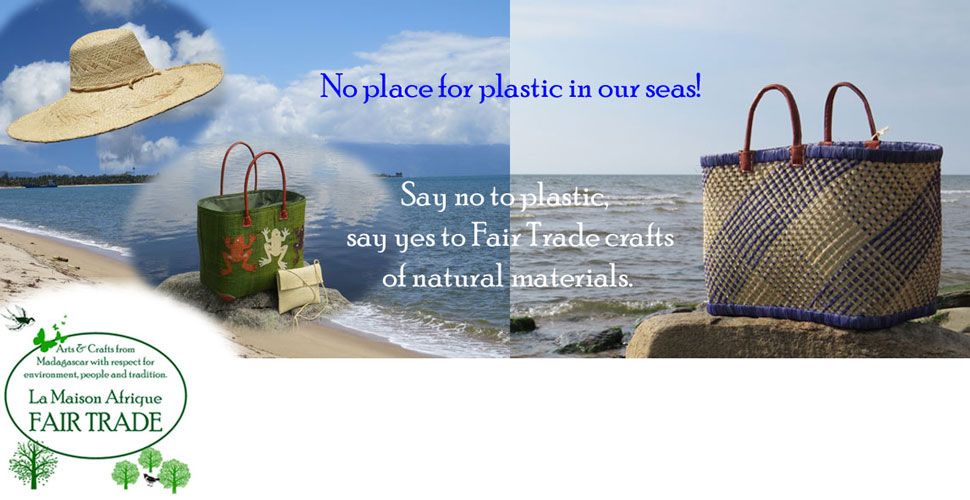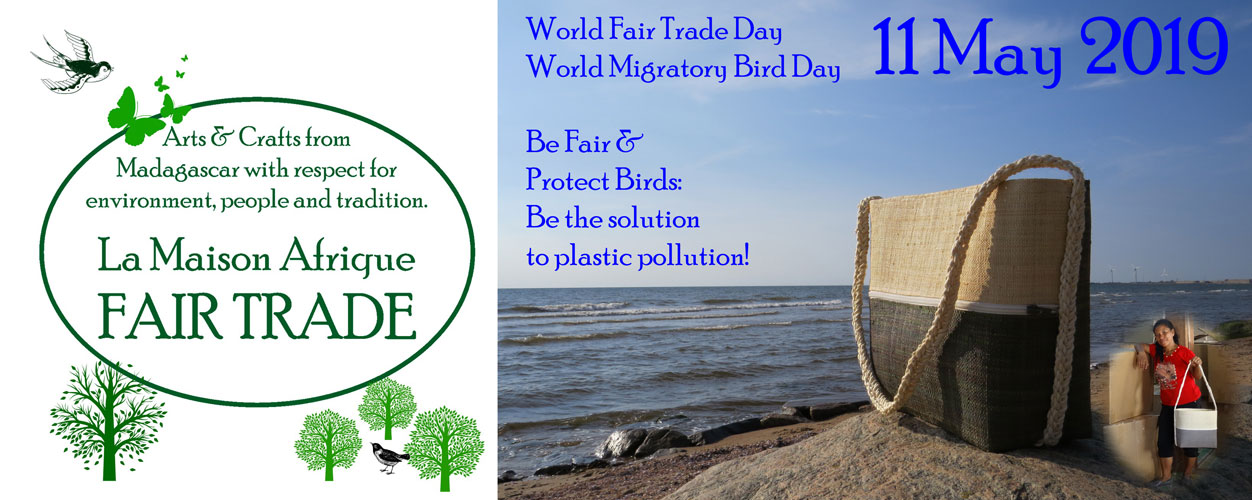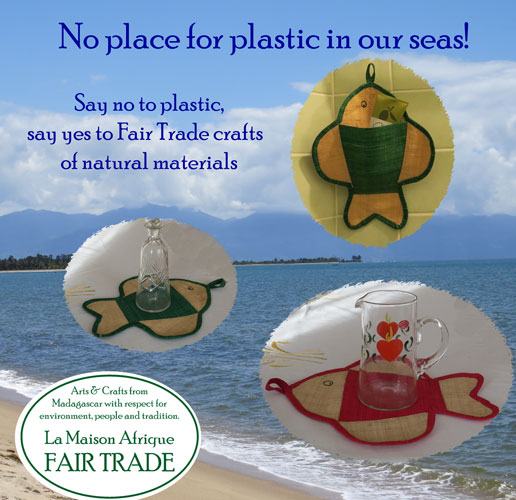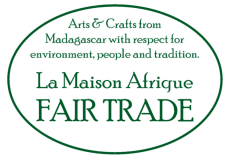NO PLACE FOR PLASTIC IN OUR SEAS!

NO PLACE FOR PLASTIC IN OUR SEAS! - Say no to plastic, say yes to Fair Trade crafts of natural materials.
Take a look into La Maison Afrique FAIR TRADE range of handbags and hats handmade of the artisan's local, renewable natural materials. Natural fibres that are beautiful and functional. See also the comprehensive assortment of gift and interior products handmade of natural or recycled materials.
World Wildlife Day March 3, 2019 has for the first time focused on the marine environment: "Life below water: for people and planet". On the campaign's website, María Fernanda Espinosa, President of the UN General Assembly, emphasizes the importance of the marine ecosystem and wildlife. The ocean contains nearly 200,000 identified species and even more unidentified. According to her, it is not accepted that we - as now is the case - every year throws about 8 million metric tons of plastic into the sea. (That means that every minute a garbage truck worth of plastic makes its way to the sea.) Plastic waste of which a smaller part remains in its original form, while a much larger part is broken down into micro plastics that are consumed by fish, other creatures and which also finds its way into people's food and water.
On March 27, 2019, the European Parliament approved a law banning the type of disposable plastic that today accounts for 70% of all marine litter. The law prohibiting these disposable plastic products comes into force in 2021. In addition, collection targets 90% for plastic bottles by 2029 and stricter application of the "polluter pays" principle.
 World Migratory Bird Day is celebrated on the same day as World Fair Trade Day, ie other Saturdays in May: 2019 May 11. This year, World Migratory Bird Day is celebrated on the theme "Protect Birds: Be the Solution to Plastic Pollution". Birds are affected by plastic waste in several ways: Foraging behaviour makes seabirds prone to ingesting plastic. Plastic is often mistaken for prey, both by form and by smell. Birds unconsciously feed their young with plastic. The chicks are even more vulnerable due to their underdeveloped organ. When swallowed, the damage caused by plastic also depends on its shape: Sharp plastic particles cause immediate death by penetrating the internal organ. Most of the time, the plastic ingestion leads to the starvation of the bird, as it gives the feeling of constantly having a full stomach. The toxicity of plastic is another threat. Entanglement in fishing nets is a deadly heat towards, in particular, seabirds. The number of seabirds dying from the effects of plastic every year is currently 1 million and growing. Research highlights the urgency of the matter: not only do 90 per cent of seabirds are estimated to have plastic in their guts, but at this rate the proportion of seabirds ingesting plastic will reach 99 per cent by 2050.
World Migratory Bird Day is celebrated on the same day as World Fair Trade Day, ie other Saturdays in May: 2019 May 11. This year, World Migratory Bird Day is celebrated on the theme "Protect Birds: Be the Solution to Plastic Pollution". Birds are affected by plastic waste in several ways: Foraging behaviour makes seabirds prone to ingesting plastic. Plastic is often mistaken for prey, both by form and by smell. Birds unconsciously feed their young with plastic. The chicks are even more vulnerable due to their underdeveloped organ. When swallowed, the damage caused by plastic also depends on its shape: Sharp plastic particles cause immediate death by penetrating the internal organ. Most of the time, the plastic ingestion leads to the starvation of the bird, as it gives the feeling of constantly having a full stomach. The toxicity of plastic is another threat. Entanglement in fishing nets is a deadly heat towards, in particular, seabirds. The number of seabirds dying from the effects of plastic every year is currently 1 million and growing. Research highlights the urgency of the matter: not only do 90 per cent of seabirds are estimated to have plastic in their guts, but at this rate the proportion of seabirds ingesting plastic will reach 99 per cent by 2050.
(World Migratory Bird Day is also celebrated on other Saturdays in October, ie the day is celebrated twice a year.)
In May 2019, about 180 of the world's countries approved a new UN regulations to prevent plastic waste being dumped in the seas. The Basel Convention of 1992, which was created to control the export of hazardous waste, has through this agreement made an addition in the form of a legally binding framework also for plastic waste. It is a question of making global trade in plastic waste more regulated, while at the same time more secure, both for people and the environment. So far, rich countries have been able to use poor parts of the world as a giant dump for their plastic waste. Malaysia, Thailand and Vietnam were the largest recipients of plastic waste in 2018. The rules are expected to come into force in a year's time.
On June 12, 2019, WWF published the analysis "No Plastic in Nature: Assessing Plastic Ingestion from Nature to People". Based on approximately 50 scientific global studies on human consumption of micro plastics, the global average is estimated to be 5 grams per week (which corresponds to the plastic in a credit card). Drinking water is one of the biggest sources, but people also get micro plastics through food such as salt, beer and seafood. Plastic pollution is also a major threat to wildlife and their habitats. Global measures are urgent and necessary to deal with the plastic crisis, says the WWF.
Plastic consumption in Sweden increased by 300,000 tonnes per year from 2010 to 2017. This means an increase of approximately 30 kilos per person and year (!) The plastic used is mainly from fossil raw material and only a small part of it is recycled. This showed a report carried out on behalf of the Swedish Environmental Protection Agency and published on June 19, 2019.
SAY NO TO PLASTIC, SAY YES TO FAIR TRADE CRAFTS OF NATURAL MATERIALS
 Look into La Maison Afrique FAIR TRADE range - and don't forget the orderliness-fish. The orderliness-fish are sewn of the artisan's locally growing, sun-dried and hand-woven raffia palm leaves. The orderliness fish is fine in many ways: A) Hang on the wall (wall basket) for storage. B) Laying on the table as a coaster, for example for carafe or water jug. C) Statement-fish: No-place-for-plastic-in-our-seas.
Look into La Maison Afrique FAIR TRADE range - and don't forget the orderliness-fish. The orderliness-fish are sewn of the artisan's locally growing, sun-dried and hand-woven raffia palm leaves. The orderliness fish is fine in many ways: A) Hang on the wall (wall basket) for storage. B) Laying on the table as a coaster, for example for carafe or water jug. C) Statement-fish: No-place-for-plastic-in-our-seas.

La Maison Afrique FAIR TRADE
-
+46 (0) 706017777
-
This email address is being protected from spambots. You need JavaScript enabled to view it. -
Trustorps Gård
311 65 Vessigebro
SVERIGE -
VAT/Orgnr: SE556526323201

